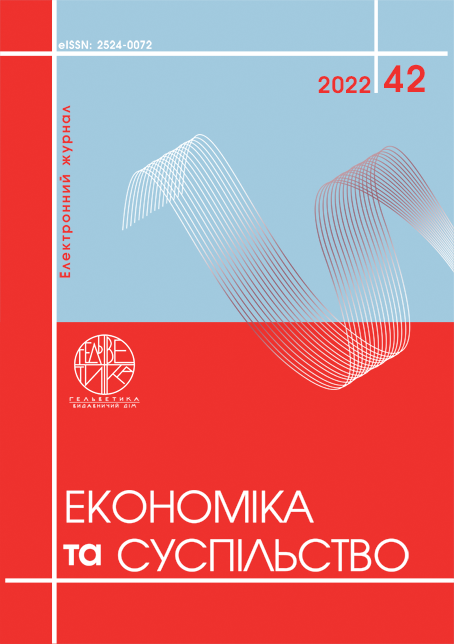SCIENTIFIC PRINCIPLES OF ANALYTICAL APPROACH TO THE FORMATION AND ASSESSMENT OF THE EFFICIENCY OF INNOVATION POLICY IN THE CONTEXT OF SUSTAINABLE DEVELOPMENT
Abstract
In the context of the development of innovation policy, the task of analyzing the innovative component of sustainable development and evaluating the effectiveness of the current innovation policy, taking into account its compliance with the Sustainable Development Goals (SDGs), arises. Despite a significant number of official documents devoted to the development of the innovation sphere and declarative strategies for ensuring national security, there is no strategic policy of the state to strengthen the influence of innovations on the state of sustainable development of the country, which makes the task of developing analytical foundations relevant from a theoretical and practical point of view. The purpose of the article is to generalize approaches to determining the relationship between the Sustainable Development Goals and innovation policy. On the basis of the analysis of scientific research and program documents from the Central Development Strategy, the problems of their integrated implementation have been identified. To analyze the impact of innovation policy on sustainable development in the context of the issue, the impact of SDG 9 on others was considered. The analysis of scientific and methodological approaches to the analysis of the relationship between the Central Bank and their factors made it possible to distinguish their groups. Strategic benchmarks for evaluating the effectiveness of innovation policy have been determined. The considered aspects make it possible to significantly increase the effectiveness of evaluating the effectiveness of the development of national innovation systems based on the use of evaluation tools, in particular: performance monitoring, which emphasizes the degree of fulfillment of the tasks set before the program; analysis of costs and benefits (cost-benefit evaluations), which compares the costs of policy implementation (preferably in comparison with alternative possibilities of using resources) with the benefits obtained as a result of implementation; impact evaluations, which focus on cause-and-effect relationships between the implementation of the program and the ultimately achieved result and are a key element of performance evaluation, because the result of the programs involves a change in the state and behavior of agents.
References
Azen R., Budescu D. V. (2003). The dominance analysis approach for comparing predictors in multiple regression. Psychological Methods, № 8, рр. 129–148.
Fu B., Wang S., Zhang J., Hou Z., Li J. (2019). Unravelling the complexity in achieving the 17 sustainable-development goals. National Science Review, № 6, рр. 386–388. DOI: https://doi.org/10.1093/nsr/nwz038
Greaves Sh. (2010). Strategic Security as a New Academic Discipline. Journal of Strategic Security, Vol. 1. № 1, рр. 7–20. DOI: https://doi.org/10.5038/1944-0472.1.1.2
Hrytsenko P., Voronenko V., Kovalenko Ye., Kurman T., Omelianenko V. (2021). Assessment of the development of innovation activities in the regions: Case of Ukraine. Problems and Perspectives in Management, № 19 (4), рр. 77–88. DOI: https://doi.org/10.21511/ppm.19(4).2021.07
ICSU and ISSC (2015). Review of Targets for the Sustainable Development Goals: The Science Perspective. Paris, International Council for Science (ICSU).
Keukeleire S., Raube K. (2013). The security-development nexus and securitization in the EU's policies towards developing countries. Cambridge Review of International Affairs, 26:3, рр. 556–572. DOI: https://doi.org/10.1080/09557571.2013.822851
Le Blanc D. (2015). Towards integration at last? The sustainable development goals as a network of targets. UN Department of Economic and Social Affairs. Working paper № 141 ST/ESA/2015/DWP/141
Nilsson M. et al. (2016). A draft framework for understanding SDG interaction. International Council for Science. June. Available at: https://council.science/wp-content/uploads/2017/05/SDG-interactions-working-paper.pdf
OECD (2017). Policy Coherence for Sustainable Development 2017: Eradicating Poverty and Promoting Prosperity. Paris.. 2017. 193 p. Available at: https://www.terveilm.ee/leht/wp-content/uploads/2017/08/Policy-Coherence-for-Sustainable-Development.pdf
Overview of methodologies and tools for SDG integration DAVID TREMBLAY. Université Du Québec À Chicoutimi Tias Webinar. 2018.
Rockström J., Sukhdev P. (2016). How food connects all the SDGs. Available at: https://www.stockholmresilience.org/research/research-news/2016-06-14-how-food-connects-all-the-sdgs.html
Stafford-Smith M. (2014). UN sustainability goals need quantified targets. Nature, № 513 (7518), рр. 281–281.
The Global Competitiveness Report (2019). K. Schwab (Ed.). Geneva, 2019. 650 p.
The World in 2050. Transformations to achieve the Sustainable Development Goals. Report prepared by the World in 2050 initiative. International Institute for Applied Systems Analysis. Laxenburg, Austria, 2018. Available at: https://iiasa.ac.at/web/home/research/twi/Report2018.html
United Nations (2014). The Road to Dignity by 2030: Ending Poverty, Transforming All Lives and Protecting the Planet. Synthesis Report of the Secretary-General On the Post-2015. Agenda. 47 p.
Worldbank (2020). Wealth Accounting. Available at: https://datacatalog.worldbank.org/dataset/wealth-accounting
Worldbank (2021). The Worldwide Governance Indicators (WGI) project. Available at: https://info.worldbank.org/governance/wgi/
Zelinka D., Amadei B. (2019) A Systems Approach for Modeling Interactions Among the Sustainable Development Goals. Part 2: System Dynamics. International Journal of System Dynamics Applications, Vol. 8. Iss. 1, рр. 41–59.
Zhou X., Moinuddin M. (2017). Sustainable Development Goals Interlinkages and Network Analysis: A practical tool for SDG integration and policy coherence / Institute for Global Environmental Strategies (IGES). 140 p.


